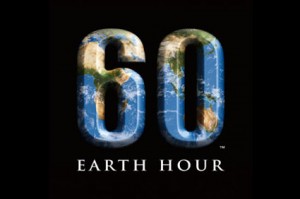 For the sixth year in a row, Canadians from coast to coast will be participating in Earth Hour festivities on Saturday, March 29th. For one hour beginning at 8:30 PM locally, residents across the country are being asked to turn off their non essential lights and appliances as a means to show support for the global fight against Climate Change.
For the sixth year in a row, Canadians from coast to coast will be participating in Earth Hour festivities on Saturday, March 29th. For one hour beginning at 8:30 PM locally, residents across the country are being asked to turn off their non essential lights and appliances as a means to show support for the global fight against Climate Change.
The event was first conceived in Australia back in 2007 as a joint venture between The World Wildlife Fund and The Sydney Morning Herald. The amazing success of the first event, where 2.2 Million residents of Sydney turned off their lights has continued to grow and spread across the globe. In 2010 for example, Earth Hour events took place in 126 different countries and predictions are similar, if not higher for this year. Some noteworthy examples of participation came from places like the Las Vegas Strip, Niagara Falls, The Eiffel Tower, Sydney Opera House, Brandenburg Gate and the Empire State Building – where each either turned off or dimmed their lights as a show of support.
With the rapid and increasing show of support for Earth Hour, some critics have emerged who say that Earth Hour does little to actually reduce the releasing of carbons into our atmosphere and thus has a negligible benefit to fighting climate change. Some have even gone so far as to suggest that it does more harm than good. The end result here is that people start to question the event and wonder why it’s being staged, what purpose does it serve and who really benefits. The answers to these questions are both simple and also more complex.
The most critical thing to understand about Earth Hour was that it was always designed to be rooted more in symbolism than in actual conservationism. While there is indeed a tangible decrease in energy consumption during Earth Hour, nobody is legitimately trying to suggest that this will have any sort of lasting calculable effect on reducing our emissions.
I can remember having a conversation with a friend of mine who holds a senior position with Ontario Power Generation on the eve of the first Earth Hour in Canada back in 2009 and I asked him if O.P.G. was supportive of the event. He said that while they were supportive they also saw the potential for Earth Hour to possibly create more carbon emissions instead of reducing them. I asked him why this was and he said that in Ontario the use of coal plants is limited to only when demand warrants it, and that typically is during the daytime. In the evenings and on weekends they rely for the most part on their nuclear plants to create enough energy.
He continued to explain that technology hasn’t advanced enough for excess manufactured energy to be stored until it is needed, so the possibly exists that if demand dropped sharply during Earth Hour it might force OPG to shut down one of its nuclear reactors. While this sounds simple enough and it can be shut down easily, the start up process is quite time, labour and cost intensive. If the next day we saw a surge in energy demand while one of the nuclear reactors is not able to provide electricity, OPG would be forced to rely more heavily on their coal or natural gas plants which in the end would wind up emitting more carbons than otherwise. The perspective that my friend presented me with was certainly an eye opener and one that many people don’t consider.
 So why am I telling you this? Am I suggesting that we shouldn’t take part in Earth Hour? Absolutely not, and I want it to be clear that I believe we should all participate in Earth Hour to the best of our abilities.
So why am I telling you this? Am I suggesting that we shouldn’t take part in Earth Hour? Absolutely not, and I want it to be clear that I believe we should all participate in Earth Hour to the best of our abilities.
The reason why I shared the above with you was to confirm in fact that Earth Hour does little to directly reduce our emissions. In fact, as I explained above the risk exists that in some rare situations, the residual consequences of a significant decrease in energy consumption within a very precise and confined period of time could cause more emissions to be created than less.
With that said, I think it is extremely beneficial for people to stop for an hour out of their frantic, harried and overburdened lives to pause for an hour to reflect upon just how energy hungry we are as a society. If everyone that participates in Earth Hour could take a portion of the time to think about how we are so utterly reliant upon energy, and then consider how they could go about reducing that reliance, then Earth Hour would have a very positive legacy that goes beyond its actual 60 minute time frame.
One of our biggest impediments to real and sustainable change with respect to energy conservationism is that we usually don’t take the time to really think about our typical energy usage patterns, and thus have no real idea how bad it is or how we might go about making positive changes. Earth Hour asks us to do just that. Sure we can spend time with loved ones by reduced light and enjoy the peace and solitude that comes with unplugging for an hour. But at the same time, we should also use part of Earth Hour to think about how we can begin to make changes once the lights come back on again.
If people can commit to turning our creative light bulbs ON while the external light bulbs are OFF to think about how we can create a society that is less reliant upon energy, then Earth Hour will be a tremendous success in the manner that it was originally mean to be. This is why Earth Hour is a good thing and why my family will be participating for the 6th year in a row.
I hope others will join with me and even encourage others to participate as well.

Leave a Reply